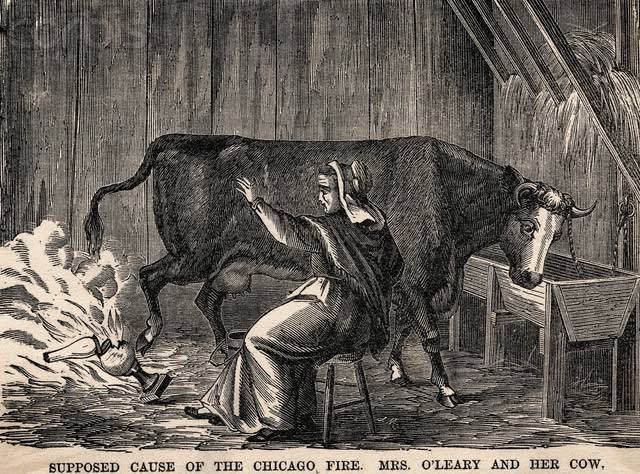Times are all approximate since paying attention to time was understandably not really the main priority for people during the fire.
October 7, 1871 (the night before): A much smaller fire that engulfs 4 blocks erupts. Takes the Chicago fire team 17 hours to put it out. Leaves fire people exhausted with damaged equipment.
–A thought: maybe there should have been more than one fire department?
October 8, 1871 8pm (according to reporters): Catherine O’Leary decides to milk her cows, a totally normal thing to do at 8pm at night.
October 8, 1871 8pm (according to Catherine O’Leary): Catherine O’Leary “goes to sleep,” said it was “hard to sleep” because some of her tenants were “playing music”.
October 8, 1871 8:30pm (according to reporters): While Catherine O’Leary was milking Daisy the Cow, the cow kicks over a lantern, lantern sets barn on fire.
–Possible reasons for kicking over lantern:
Angry at Mrs. O’Leary for owning her
Angry at the world for mistreatment of cow
Grooving to the music
Udders being squeezed is painful and leg jolted in pain
A sneeze
October 8, 1871 8:30pm (according to Catherine O’Leary): Fire begins in barn, unclear why.
–Possible reasons why:
Wind knocked over lantern
Drunken Irish musicians knocked over lantern
Someone had resentment for the O’Learys (Spurned lover? Rival milker? Anti-Irish bigotry?) and set fire to barn
Daisy the Cow kicked over the lantern (see reasons above)
October 8, 1871 8:30-9pm: Fire spreads in the poor Irish immigrant neighborhood on the southwest side of Chicago, where the houses are all built close together and made of lumber because, idk, that seems like a reasonable thing to build a house out of.
October 8, 1871 9pm: Matthias Schaffer, a watchman overseeing the city from the courthouse tower, sees smoke and sounds the alarm bells. However, he mislocated the fire and sent the firefighters to the wrong place.
–Um, hold on, feels odd that Matthias was never blamed for this fire when he really messed this up???? You had one job!!!
October 8, 1871 10pm: Firefighters finally reach the fire (no thanks to Matthias!!!) but it had already spread through the whole neighborhood. Firefighters are also exhausted from previous day’s fire, and only have damaged equipment to fight it.
October 8, 1871 11pm: Big gusts of wind create fire whirlwinds called “fire devils” which are sucking up roofs, setting them on fire, and flinging them far out.
–Terrifying.
October 8, 1871 11:30pm: Fire is approaching the river that separates the west and east side of Chicago, and everyone thinks “surely, the fire will stop at the river.”
October 8, 1871 11:45pm: Fire does not stop at the river. (River full of lumber from, erm, building houses out of lumber. Lumber catches fire.)
October 9, 1871 12:00am: Fire reaches Southside Gasworks which lights most of the city. Gastank explodes plunging Chicago into darkness.
–Although, frankly with this fire, could you argue darkness is really the problem right now?
October 9, 1871 12:30am: Fire starts moving north, which is where all the Businesses are and the Fancy people live, so obviously NOW it is a Big Problem. Rowell B. Mason, the Mayor of Chicago, sends a telegraph to nearby cities (Milwaukee, Detroit, etc.) and says “H E L P?!”
October 9, 1871 2am: Head of the Chicago Tribune tries to make the newspaper for the morning because our human need to document our lives on social media was strong even back then. But Chicago Tribune office burns down.
October 9, 1871 2:30am: Fire heads towards Chicago Water Works, which was built just 2 years prior to provide Chicago with clean water from Lake Michigan. Everyone thinks “surely, the fire will not destroy a tower full of water.”
October 9, 1871 2:30am: Fire does destroy Water Works and prevents water from going into hydrant. Everyone appropriately thinks, “Welp, this is the end.”
-Water Works building not destroyed though as it was built of stone (SMART!) and still stands today!
October 9, 1871 3am: Fire still raging! People fleeing!
October 9, 1871 4am: Fire still raging! People fleeing!
October 9, 1871 5am: Fire still raging! People fleeing!
October 9, 1871 6am: Fire still raging! People fleeing! Some looting starting too.
October 9, 1871 7am: Sunrise and fire still raging!
–Does the extra sunlight even make a difference?
October 9, 1871 11am: At this point some people give up fleeing. A lot of folks stand in Lake Michigan and watch the fire burn. What else is there to do?
October 9, 1871 Sometime At Night: RAIN!!!!!!!!!! Fire had been dwindling but finally gets put out through rain.
But the damage has been done. The land is flat, a prairie of rubble, a ghost town with no landmarks. Char and tar and soot and blackened remains. 300 people lost their lives, 100,000 people lost their homes (⅓ of the population at the time).
And of course, as with every devastating traumatic event, there must be someone to blame. 50 people were questioned, but Catherine was the prime suspect. A judge actually ruled she was not responsible and that bad building infrastructure was th culprit. But the rumors of her and her alleged late-night milking habits became fact. She was even listed in history books as the cause for a century. Songs and books were written about her.
October 6, 1997: Almost exactly 126 years after the Great Fire, the City of Chicago officially absolves Catherine O’Leary of any blame and she is exonerated…as is her cow.
–The cow? People were particularly harboring resentment and blame towards the cow? Hmm. Hmmmmmmmmmmmmmmmmmmm….
Authors
-

Julia Izumi's plays include Regretfully, So the Birds Are (Playwrights Horizons/WP Theater), miku, and the gods. (ArtsWest), and Sometimes the Rain, Sometimes the Sea (Rorschach Theater). Select development: Manhattan Theatre Club, WP Theater, Ojai Playwrights Conference, Oregon Shakespeare Festival, NNPN/Kennedy Center MFA Playwrights’ Workshop. Past memberships & residencies: Clubbed Thumb’s Early-Career Writers’ Group, New Georges Audrey Residency, The COOP's Clusterf**k, Berkeley Rep’s Ground Floor, SPACE on Ryder Farm. Awards and honors: OPC Dr. Kerry English Award, Theater Masters’ Visionary Playwright Award, and KCACTF’s Darrell Ayers Playwriting Award. Current New Dramatists Resident and LMCC Workspace Resident. Current commissions: True Love Productions, MTC/Sloan, Playwrights Horizons, Seattle Rep 20x30. MFA: Brown University.
View all posts -

Alex Ates is from New Orleans. He's the incoming director of theater arts at Westtown, a Quaker school outside of Philly, and an incoming Dean's Scholarship graduate student at NYU Gallatin. His writing has appeared in American Theatre, Backstage, Incite/Insight, and Scalawag. Alex was the education and engagement director of The NOLA Project, where he is still an ensemble member. He currently serves on the board for the American Alliance for Theatre and Education (AATE) and Goat in the Road Productions. With an MFA from The University of Alabama, Alex is the recipient of the SETC Graduate Young Scholar Award for his research on the Free Southern Theater and his research on Stage Studies at Black Mountain College is to be published as a chapter in the 28th edition of Theatre Symposium. Alex has been a guest director at Emerson College, Agnes Scott College, and Tulane University. He is the editor of AATE's Incite/Insight. BA from Emerson. iAmAlexAtes.com
View all posts









